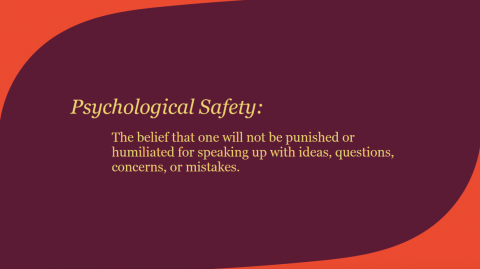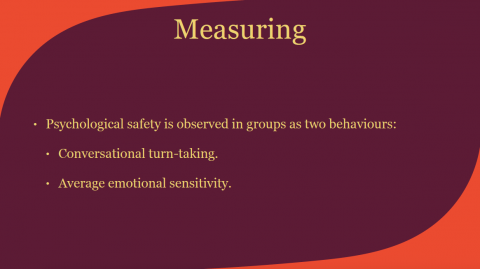RWDevCon 2017 Inspiration Talk: Building Compassionate Software by Ash Furrow
In this inspiration talk from RWDevCon 2017, Ash Furrow discusses the science and mechanics of software team dynamics with useful tips and best practices to help improve any team environment. By Ash Furrow.
Sign up/Sign in
With a free Kodeco account you can download source code, track your progress, bookmark, personalise your learner profile and more!
Create accountAlready a member of Kodeco? Sign in
Sign up/Sign in
With a free Kodeco account you can download source code, track your progress, bookmark, personalise your learner profile and more!
Create accountAlready a member of Kodeco? Sign in
Contents
RWDevCon 2017 Inspiration Talk: Building Compassionate Software by Ash Furrow
20 mins
- Transcript
- Feelings matter
- What Is Empathy?
- What Is Psychological Safety?
- Google Your Feelings
- Measuring Psychological Safety
- Benefits of Psychological Safety
- How Do We Implement Psychological Safety?
- Admit Fallibility
- Frame All Work As Learning Experiences
- Model Curiosity
- Other Tactics
- Where to Go From Here?
We recorded these talks so that you can enjoy them even if you didn’t get to attend the conference. Here’s one of the inspiration talks from RWDevCon 2017: “Building Compassionate Software” by Ash Furrow. I hope you enjoy it!
Transcript
If you made a mistake, you would want your colleague to tell you, right? Just like if your colleague had an interesting idea, even if it was a little unconventional, you’d want them to let you know. But chances are, you’ve been in a situation to speak up, and you haven’t.
Why? Why don’t we speak up? And what effect does that have on the team performance overall?
Today we’re going to be talking about psychological safety, what it is and how it can help your team perform better.
First, feelings matter. We’re going to talk about some of the evidence that shows that feelings matter and why they’re important. Second, we’re going to take a look at psychological safety and some of the cool things that you can do with that. And finally, we’re going to take a look at how to implement psychological safety on your team.
Let’s get started.
Feelings matter
This sounds obvious to some people. It sounds not-obvious to some other people, and that’s okay. It’s something I’ve talked a lot about at conferences. I’ve written about it on my blog. I think that feelings are really important. Why do I think that?
Because science says so. We’ve actually done a lot of research into empathy and feelings, and I want to share one study with you, a recent study out of New York.
High school students in a science class were divided into two groups and given two different curricula. The first group of students learned about the accomplishments, the lives and the struggles of some of history’s greatest scientists. The other group only learned about the accomplishments themselves and the actual theories that came out of them. What was interesting is that to the researcher’s surprise, but not really to mine, the students who learned about how scientists had struggled throughout history against sexism, against classism and against depression, when the students learned about those struggles, their test scores improved.
What’s really interesting is that the other group of students who didn’t learn about those struggles, who didn’t learn to empathize with history’s greatest scientists, their test scores went down. This suggests that only is empathy really helpful, but that a lack of empathy can actually be harmful.
What Is Empathy?
In the ’90s, an academic by the name of Theresa Wiseman came up with four necessary components to empathy:
- Seeing the world as others see it.
- Recognizing and understanding another’s feelings.
- Staying non-judgmental.
- Communicating to that person that you understand.
First, you need to understand someone’s point of view. Next is to understand what that person is feeling. Third and really importantly is to stay non-judgmental about what that person is thinking and feeling. Finally, really importantly, you need to communicate to that person that you understand. These are things that we can do. These are activities that we can practice and these are habits that we can form.
What does it look like when you work on a team that values feelings? Well, that’s psychological safety.
Teams with psychological safety perform better than teams without. Has anyone heard of the term “10x developer”? It’s this mythical idea that some developers are just intrinsically ten times as productive as others. It’s not true, but you could be a 10x developer if you made each of the five people you work closest with twice as productive. To me, that’s a 10x developer.
You can be a 10x developer if you take some of the evidence that we talk about today and bring it back to your team, and make your team more productive. You can be a 10x developer by implementing psychological safety.
What Is Psychological Safety?
Psychological safety is the belief that you won’t be punished or humiliated for asking a question, raising a concern, or admitting a mistake.
It’s a very simple concept, but it’s a really powerful one. We know that teams who exhibit psychological safety perform better than those who don’t, and we know this thanks to a somewhat unlikely source: Google.
Google Your Feelings
Google ran a five-year study called Project Aristotle. It’s a study performed on their own employees, which they have thousands of, and the goal of the study was to determine a leading indicator, something that would predict whether or not a team would perform well. By and far the biggest predictor of team performance was psychological safety.
This is Google we’re talking about. They AB test the shade of blue that they use on Gmail’s Send button. They’re incredibly data driven, and they came to the conclusion that feelings are important, which I think is pretty cool.
I’d like you to think back to an occasion when you were working on a team where you didn’t feel like you could ask a question or admit a mistake or propose an idea. Was the project that team worked on successful? Do you think it would have been more successful if you were working in a more psychologically safe environment?
Psychological safety is important so that we feel safe to ask questions and to admit mistakes. It’s important that we feel like our voice is heard. It’s especially important in small resource-constrained start-ups that a lot of us work at where small mistakes can cost the entire company.
So that’s what psychological safety is. How do we measure it?
Measuring Psychological Safety
Psychological safety is measurable in one of two activities that are exhibited by teams.
The first is called conversational turn-taking. Conversational turn-taking is how often a participant in a conversation switches from listening to speaking. That’s all. The more this happens the better, because everyone needs to be able to feel like they have a say in the conversation.
The second attribute is a little trickier. It’s called average emotional sensitivity. Emotional sensitivity is how likely anyone on your team is to empathize with someone else. If they’re having a really good day or a really bad day, how likely are they to reach out? How likely are they to understand what another person is thinking or feeling? How likely are they to stay non-judgmental and communicate that back to the person? That’s average emotional sensitivity.



